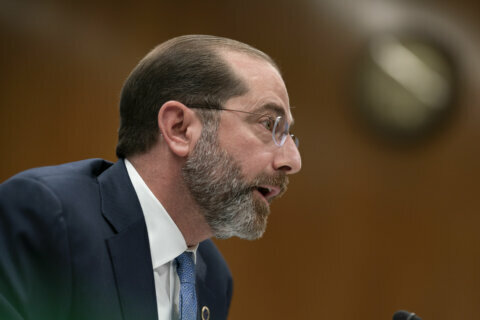
The situation with COVID-19, the novel coronavirus that has struck more than 80,000 people worldwide, is changing day-to-day. But an official at a D.C.-area health care system told WTOP they’re ready for whatever happens.
“We’ve been preparing, really since late December, for coronavirus,” said Dr. Glenn Wortmann, section director of infectious diseases at MedStar Washington Hospital Center.
They’ve been teaching workers about the importance of wearing masks, masking patients who have possible symptoms, washing hands and identifying possible patients, Wortmann said.
Wortmann is also medical director for infection prevention within MedStar Health, which comprises of five hospitals in the D.C. area and five in Baltimore.
MedStar has also established protocols for dealing with patients who come back from China, especially if they’re still within the 14-day period it can take for someone to get sick once they have the virus.
More coronavirus news
- Coronavirus: What you need to know
- ‘Time is everything’: World braces for spread of new virus
- Trump, US officials send mixed messages on virus risk here
- Study begins in US to test possible coronavirus treatment
- 6 European nations report virus cases with Italy link
- Fairfax County health official warns against coronavirus panic
“If they have symptoms of respiratory tract infections, they would be isolated and masked, and then we would evaluate them for coronavirus,” Wortmann said.
All that said, it’s worth remembering that for most people, even those with the coronavirus, it’s not a big deal.
“It seems that most patients do well with this infection,” Wortmann said. “Approximately 80% have a self-limiting infection, and it’s more like a common cold.”
Such patients “would be given an initial evaluation and told to go home.”
About 15% need to go into the hospital, and they go into a negative-pressure room that sucks viruses out of the air.
As cases of the new virus rise across the globe, its spread in the U.S. is likely, health officials said Tuesday.
As The Associated Press reported, Dr. Nancy Messonnier, of the Centers for Disease Control and Prevention, told reporters, “It’s not so much a question of if this will happen anymore, but rather more a question of exactly when this will happen — and how many people in this country will have severe illness.”
Later that day, Wortmann also said the virus was likely to hit the U.S.: “We may see this periodically, just like we see influenza or other viruses periodically.”
That said, there have been no confirmed cases of the virus in D.C., Maryland or Virginia. And Wortmann said he likes how health officials have been dealing with the problem so far.
He said he has listened in on regular conference calls between health providers and other officials, as well as information calls from the CDC and state health departments.
Wortmann said the calls focus on “what’s going on, what the cases look like, information about what testing is available and where we’re moving in the future, and suggestions for patient management.”
He added, “I’ve been very pleased with the flow of information that’s been coming down. I think, as a front-line provider, I’m getting the information I need.”
So, at this point, he’s cautious.
“As Yogi Berra said, ‘It’s very hard to make predictions, especially about the future.’ We’re going to have to see where this goes over the next month. We may be in this for the long haul; this may be something that goes on for a year or two, where we periodically see cases of coronavirus. At this point, it’s difficult to say where it’s going to go,” Wortmann said.
Anyway, at the moment, Wortmann said, Americans have another problem on their hands, so to speak: the regular flu.
“The flu is much more of a concern right now for everybody in the United States than coronavirus,” Wortmann said. And, we’re not out of the woods yet: “Last year, flu season went well into May. … We’ve probably got a few more months of flu season left.”
It’s not too late to get a flu shot, Wortmann said, and he ran down the usual list of precautions: Wash your hands, avoid people who are sick and avoid other people if you’re sick yourself.
WTOP’s Kristi King contributed to this report.







